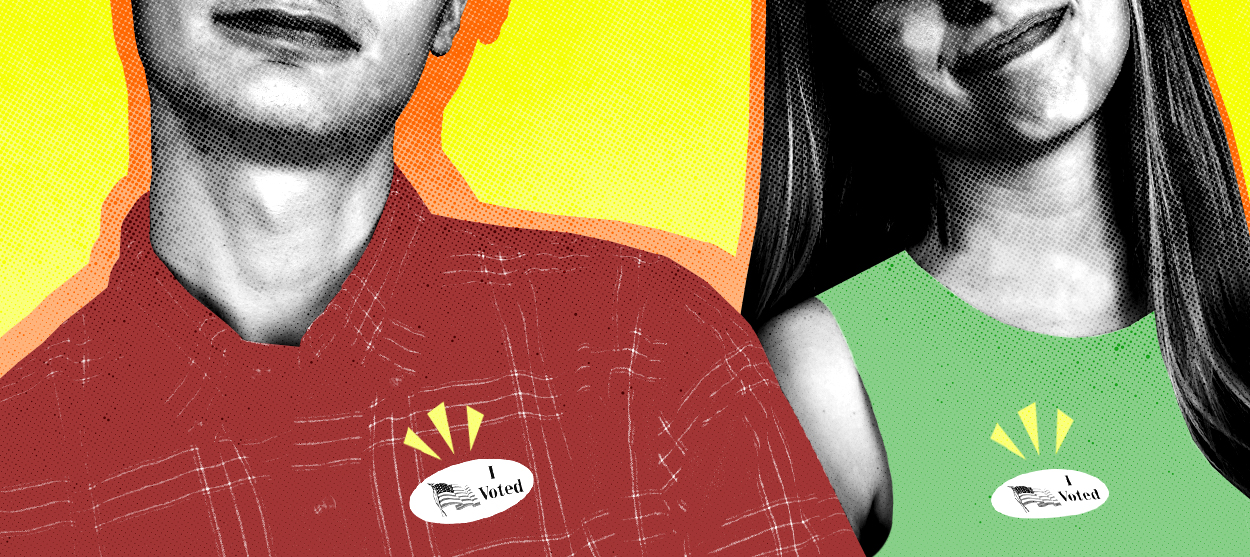How to talk to teens about voting
A guide to helping young people engage with the political system


A free daily email with the biggest news stories of the day – and the best features from TheWeek.com
You are now subscribed
Your newsletter sign-up was successful
For the average teen, the right to vote might not be the most exciting part of turning 18. They're probably thinking about things like heading off to college or getting a job. Or they might just check out because they can't relate to politics, political figures, or the complicated (and sometimes boring) political system.
If you want your kids to get even a little bit excited about participating in the political process, it's a good idea to start the conversation long before they turn 18. "This prepares them for being citizens and for taking up the responsibilities, rights, and freedoms that we have in a democracy," says Brooke Ackerly, professor of political science at Vanderbilt University.
Having said that, it's never too late. "Teenagers are exposed to so much politics," Ackerly says. Political issues in the news may seem far removed from their lives, but you can make it relevant by talking about what happens in their classroom or workplace. Who decides the rules? Are they good rules? Do they work? What environment do they foster? What happens when someone doesn't follow the rules?
The Week
Escape your echo chamber. Get the facts behind the news, plus analysis from multiple perspectives.

Sign up for The Week's Free Newsletters
From our morning news briefing to a weekly Good News Newsletter, get the best of The Week delivered directly to your inbox.
From our morning news briefing to a weekly Good News Newsletter, get the best of The Week delivered directly to your inbox.
When it comes to talking to teens about voting, Ackerly suggests starting with a question: Why is it important to vote? Your teen might not have a definite answer, but it encourages them to think independently. "If you have these kinds of conversations with your children, then politics in general — how we should live together and why — becomes a subject with which they have personal experience and about which they have well thought out opinions," Ackerly says.
Your teen might not agree with you on political issues, and it's not your role to change their mind. "Children have to have their own sense of what they care about for a political community that they are a part of before they can develop their opinion — or adopt or reject their parents' opinion," Ackerly says.
Instead of focusing on what your teen's views are on particular political issues, consider why they feel the way they feel. Sure, you want them to trust your opinion, but they're getting their information from a huge range of sources, from network news and podcasts to Facebook and Instagram. "You want them to be able to think for themselves," Ackerly says. "Why do they trust a particular media source? Do they trust it because they like the person? Because their friends do? Because they agree with what they say?"
In 2016, 46.1 percent of 18 to 29 year olds voted, per data from the U.S. Census Bureau. But it wasn't only a lack of interest that kept the remaining 53.9 percent away from the ballot box. It's no secret that the American electoral system is particularly confusing, and young people have less experience with the process. A recent survey by the Center for Information & Research on Civic Learning and Engagement found that although the majority of young people (ages 18-24) are paying attention to the 2020 election, a third of them didn't even know whether they could register to vote online in their state. And less than half of them (47 percent) said they had been contacted by a political campaign this year.
A free daily email with the biggest news stories of the day – and the best features from TheWeek.com
Plus, of course, there's the pandemic problem. In the run-up to previous elections, volunteer registrars would be providing in-person help to students on campuses across the country. But as many schools move classes online to help reduce the spread of COVID-19, that level of assistance is absent. In states where there's no online voter registration, like Arkansas, Maine, and Texas, the impact on voter registration is huge.
Every state has different deadlines for voter registration. In New York, it's 25 days before Election Day if you register in person or online. If you register by mail, your registration must be postmarked 25 days before Election Day and received 20 days before Election Day. (North Dakota is the only state that doesn't have voter registration — you simply need to take valid proof of ID and residency to the polls in order to vote.)
The amount of information can be overwhelming, but Vote.org has all the deadlines, dates, and rules for each state. Your teen can register to vote (and check if they're registered, if they're not sure), request a vote by mail if they can't or don't want to vote in person on Election Day, find their nearest polling place, and request election reminders so they never miss a future election.
Want more essential commentary and analysis like this delivered straight to your inbox? Sign up for The Week's "Today's best articles" newsletter here.
Claire Gillespie is a freelance writer with bylines on Health, SELF, Refinery29, Glamour, The Washington Post, and many more. She likes to write about parenting, health, and culture. She lives in Scotland with her husband and six kids, where she uses every (rare) spare moment to work on her novel.
-
 Local elections 2026: where are they and who is expected to win?
Local elections 2026: where are they and who is expected to win?The Explainer Labour is braced for heavy losses and U-turn on postponing some council elections hasn’t helped the party’s prospects
-
 6 of the world’s most accessible destinations
6 of the world’s most accessible destinationsThe Week Recommends Experience all of Berlin, Singapore and Sydney
-
 How the FCC’s ‘equal time’ rule works
How the FCC’s ‘equal time’ rule worksIn the Spotlight The law is at the heart of the Colbert-CBS conflict
-
 The billionaires’ wealth tax: a catastrophe for California?
The billionaires’ wealth tax: a catastrophe for California?Talking Point Peter Thiel and Larry Page preparing to change state residency
-
 Bari Weiss’ ‘60 Minutes’ scandal is about more than one report
Bari Weiss’ ‘60 Minutes’ scandal is about more than one reportIN THE SPOTLIGHT By blocking an approved segment on a controversial prison holding US deportees in El Salvador, the editor-in-chief of CBS News has become the main story
-
 Has Zohran Mamdani shown the Democrats how to win again?
Has Zohran Mamdani shown the Democrats how to win again?Today’s Big Question New York City mayoral election touted as victory for left-wing populists but moderate centrist wins elsewhere present more complex path for Democratic Party
-
 Millions turn out for anti-Trump ‘No Kings’ rallies
Millions turn out for anti-Trump ‘No Kings’ ralliesSpeed Read An estimated 7 million people participated, 2 million more than at the first ‘No Kings’ protest in June
-
 Ghislaine Maxwell: angling for a Trump pardon
Ghislaine Maxwell: angling for a Trump pardonTalking Point Convicted sex trafficker's testimony could shed new light on president's links to Jeffrey Epstein
-
 The last words and final moments of 40 presidents
The last words and final moments of 40 presidentsThe Explainer Some are eloquent quotes worthy of the holders of the highest office in the nation, and others... aren't
-
 The JFK files: the truth at last?
The JFK files: the truth at last?In The Spotlight More than 64,000 previously classified documents relating the 1963 assassination of John F. Kennedy have been released by the Trump administration
-
 'Seriously, not literally': how should the world take Donald Trump?
'Seriously, not literally': how should the world take Donald Trump?Today's big question White House rhetoric and reality look likely to become increasingly blurred
